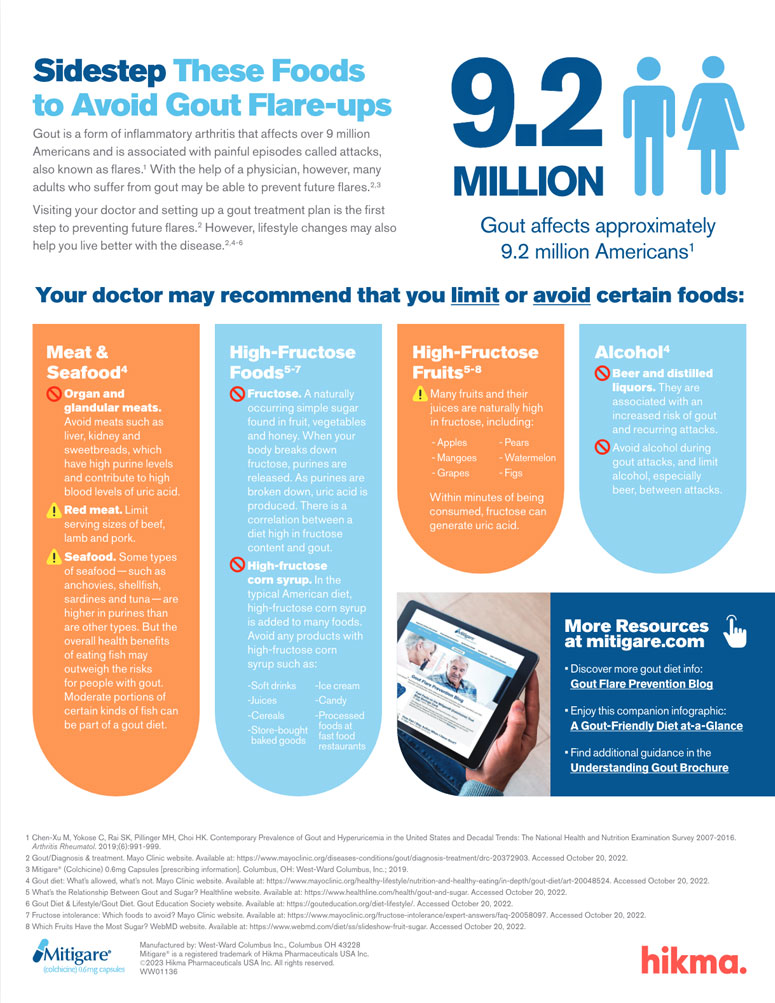
More than eight million Americans are currently living with gout.1 If you are one of them, your doctor may have prescribed you a urate-lowering therapy (ULT) such as allopurinol. Allopurinol can help to prevent gout flares because it slows down uric acid production in the body.2
Allopurinol is just one part of therapy, however.3 If you take allopurinol, your doctor may also prescribe colchicine.3 Many adults with gout take allopurinol and colchicine or another anti-inflammatory medicine as part of their gout flare prevention treatment program.3
Uric acid and gout
Gout is a type of inflammatory arthritis caused by a build-up of uric acid in the bloodstream.1 This excess uric acid causes crystals to form around one or more joints.1 Adults with gout experience episodes of sudden and intense pain, redness, swelling and/or extreme tenderness in a joint, often beginning with the big toe.4
Because uric acid builds up over time, symptoms may not appear for months or even years.5 Once the first attack has occurred, however, flares usually become more frequent and more painful.6 Eventually they begin to occur on a regular basis, and the pain is more severe and long-lasting.5,6 Gout may also cause joint damage, which may result in lost mobility.6 These are just a few of the reasons why it is so important to gain control of gout early on.5,6
The link between allopurinol and gout flares
As allopurinol reduces the amount of uric acid in the bloodstream, urate crystals in the joints begin to dissolve.7 But as the uric acid crystals begin to dissolve, a gout flare can occur.7 Fortunately, when used as directed, anti-inflammatory medicines such as colchicine can help prevent gout flares in adults who are starting allopurinol or another ULT.7
Preventing gout flares with allopurinol and colchicine
The American College of Rheumatology (ACR) Guidelines for Management of Gout suggest that patients begin an anti-inflammatory medicine before or during ULT with medicines such as allopurinol.3 Specifically, the ACR recommends low-dose colchicine (0.6 mg orally once or twice a day) as an option for gout flare prevention in adults.3 Colchicine is the active ingredient in a medication called Mitigare® (Colchicine) 0.6 mg Capsules, indicated for the prevention of gout flares in adults.8 The safety and effectiveness of Mitigare® for acute treatment of gout flares during prophylaxis has not been studied. Mitigare® is not an analgesic medication and should not be used to treat pain from other causes.
Colchicine 0.6 mg capsules are contraindicated in patients with renal or hepatic impairment who are currently prescribed drugs that inhibit both P-gp and CYP3A4. Combining these dual inhibitors with colchicine in patients with renal or hepatic impairment has resulted in life-threatening or fatal colchicine toxicity. Patients with both renal and hepatic impairment should not be given Mitigare®. The most commonly reported adverse reactions with colchicine are gastrointestinal symptoms, including diarrhea, nausea, vomiting, and abdominal pain. Click here for complete product information, including a patient Medication Guide.
Eligible patients may save on colchicine
With the True Blue Savings card, eligible patients can get their first 30-day supply (up to a maximum of 60 capsules) of Mitigare® (Colchicine) 0.6 mg Capsules or Generic Colchicine 0.6 mg Capsules for as little as $0, up to a maximum savings of $65. For refills, eligible patients can save on their out-of-pocket costs and pay as little as $5 per refill of Mitigare® or Generic Colchicine 0.6 mg Capsules, up to a maximum savings of $50 per 30-day supply (up to a maximum of 60 capsules).
Dispenses for a 60-day supply (up to a maximum of 120 capsules) and 90-day supply (up to a maximum of 180 capsules) are permissible within the terms of the program, up to a total of a 12-month supply.
Find out if you are eligible for True Blue Savings now by reviewing the complete Terms & Conditions for the program.
Sidestep these Foods to Avoid Gout Flare-ups
See this checklist of foods your doctor may recommend that you limit or avoid.
INFOGRAPHIC
Talk with your doctor
If you are taking allopurinol and still experiencing gout flares, talk with your doctor. Your doctor will be able to offer treatment options that best meet your individual needs and may help you prevent future gout flares. You may want to download and complete the Gout Flare Questionnaire (from Resources for Patients) before your appointment.
*For all eligible patients 18 years or older who are legal residents of the United States or Puerto Rico. First 30 days are as little as $0 only for eligible patients. Maximum savings of $65 on the first fill and $50 on refills. Please see complete Terms and Conditions for details.
NOTE: This article was not written by a medical professional and is not intended to substitute for the guidance of a physician. These are not Hikma’s recommendations for gout flare prevention, but rather facts and data collected from various reliable medical sources. For a full list of resources and their attributing links, see below.

